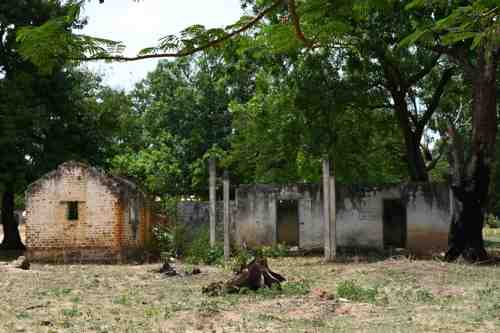Jina Moore, for the Pulitzer Center
Bangui, Central African Republic
About twenty minutes after I took this photo, a man came up to me. "You're a photographer?" he asked. I felt a little feisty but I tried to be polite. I'd been hassled on this corner twice already, once by a woman wearing a security guard's uniform who was satisfied simply to know I was a journalist, and once by an over-eager, skinny little man who gruffly demanded to know who I was, who I worked for, where I came from, and whether I had the proper paperwork to be doing what I was doing. He flashed a laminated ID card and said he was a police officer. I showed him an accreditation letter from the ministry and after a few long minutes of scrutiny, he gave it back and apologized
So I was feeling defensive when Charles, a tall man with a round belly, came up and posed the question. "Yes," I said. "Sort of. I'm a journalist." He beamed and pulled from his bag an ancient Minolta camera, hugged together by black electrical tape, and exclaimed, "I'm a photographer too!"
My heart melted; this was my first camera, too. And even for someone who wouldn't dare refer to herself as a photographer around, er, actual photographers, the first camera is a sweet memory. I'd ditched it in a move after an $85 repair failed me, and even though the thing was unusable, I'd regretted it. How Charles kept his working, I have no idea.
"I have so many pictures inside," he said, gesturing to this camera shop. It was 6:45 in the morning; the shop wouldn't open until 9, well after I was on the road. "I wish you weren't leaving," he said. "We could trade shots and tell stories."
As I took my leave from Charles, I remembered a man I had met the day before, whose name I don't know. He was selling cold Cokes outside the World Health Organization headquarters. Underneath the bag where he kept small change was sheet music.
"You're a musician?" I asked.
"No, a composer," he corrected me. He pulled his sheet music out for me to look at; the flirtatious flags of the eighth notes, the thick hips of the whole notes, the five-line musical staph, all had been penned perfectly by hand.
"It's too bad I don't have my violin," I offered. "I could play your music and you could sing the words."
"But can you read music?" he asked me. I nodded, and he looked surprised. "That is impressive!"
I'm not going to find anyone to publish a story about Charles, or about the anonymous Bangui church composer. But meeting Charles and the composer reminded me that Bangui, like every other place I've been in Africa, is full of culture foreigners don't see. Partly, that's because most of us are not smart enough to ask the right questions. We don't go to church and try to sing the hymn the youth leader wrote; we don't ask the guy who prints our passport pictures if he's also a photographer and whether he has any prints he'd like to show us.
We should start.
This reporting project is made possible through the support of the Stanley Foundation.



